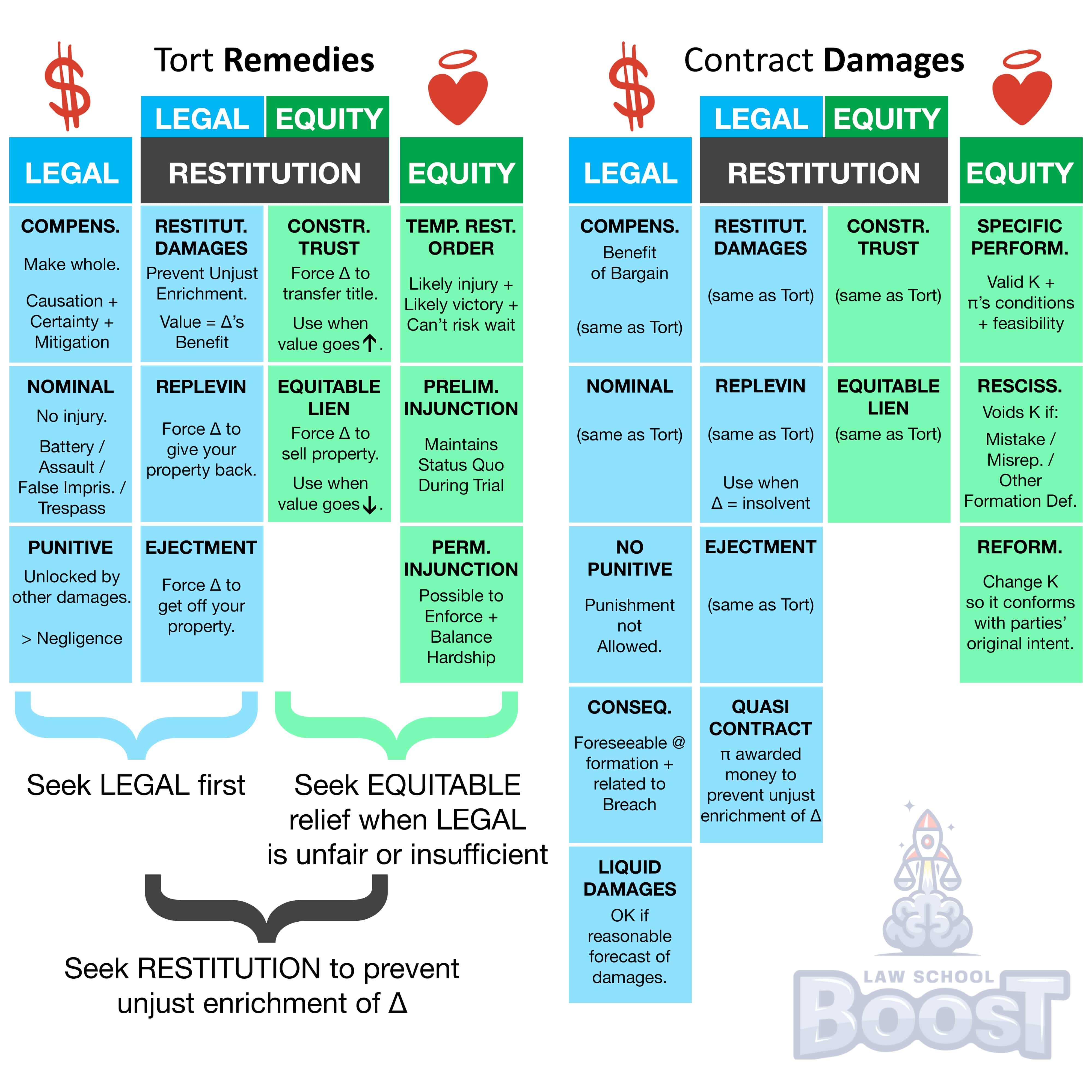🏥
Remedies • Contract - Legal Remedies
REM#038
Legal Definition
Compensatory damages in contract are based on the injury to the plaintiff, in the form of (1) expectation damages (benefit of the bargain); (2) consequential damages; and (3) incidental damages.
Plain English Explanation
Compensatory damages in contracts are money given to someone when they've been harmed because of a broken agreement. There are three types of these damages:
Expectation damages: This is the money that would have made the person whole if the contract was fulfilled. It's like getting what you expected from the deal.
Consequential damages: These are extra losses that happen because the contract was broken, but they aren't directly part of the contract. For example, if you hired someone to fix your roof before a big storm and they didn't, any damage from the storm to your furniture could be consequential damages.
Incidental damages: These are small costs that come up when trying to deal with the broken contract, like if you had to pay to store goods because they weren't delivered on time.
The purpose of these damages is to put the harmed person in the position they would have been in if the contract was carried out properly (sometimes called "making them whole"). This rule exists to make sure that when someone breaks a contract, the other person doesn't suffer unfairly.
Expectation damages: This is the money that would have made the person whole if the contract was fulfilled. It's like getting what you expected from the deal.
Consequential damages: These are extra losses that happen because the contract was broken, but they aren't directly part of the contract. For example, if you hired someone to fix your roof before a big storm and they didn't, any damage from the storm to your furniture could be consequential damages.
Incidental damages: These are small costs that come up when trying to deal with the broken contract, like if you had to pay to store goods because they weren't delivered on time.
The purpose of these damages is to put the harmed person in the position they would have been in if the contract was carried out properly (sometimes called "making them whole"). This rule exists to make sure that when someone breaks a contract, the other person doesn't suffer unfairly.
Hypothetical
Hypo 1: Bob agrees to sell Sam a rare painting for $10,000. After the agreement, but before delivering the painting, Bob sells it to someone else for $15,000. Sam had already cleared a space in his gallery and advertised the painting's unveiling, expecting a lot of visitors and sales from other artworks. Result: Sam can claim expectation damages for the value of the painting he expected to get, consequential damages for the lost sales from the event, and incidental damages for the cost of the advertisement and preparations.
Hypo 2: Bob was contracted by Sam to deliver 100 chairs for Sam's event. Bob delivers only 50. Sam has to urgently rent 50 more chairs from a nearby supplier at a higher price. Result: Sam can claim expectation damages for the cost difference between the agreed price and the rental, and incidental damages for the extra effort and cost to rent the chairs urgently. There might not be any consequential damages unless there were further losses due to the shortage.
Hypo 3: Bob and Sam are neighbors. Bob's tree falls and damages Sam's fence. There was no contract between them about the tree. Result: The rule about compensatory damages in contracts doesn't apply here because there was no contract about the tree. This would be a different kind of legal issue, not a contract issue.
Hypo 2: Bob was contracted by Sam to deliver 100 chairs for Sam's event. Bob delivers only 50. Sam has to urgently rent 50 more chairs from a nearby supplier at a higher price. Result: Sam can claim expectation damages for the cost difference between the agreed price and the rental, and incidental damages for the extra effort and cost to rent the chairs urgently. There might not be any consequential damages unless there were further losses due to the shortage.
Hypo 3: Bob and Sam are neighbors. Bob's tree falls and damages Sam's fence. There was no contract between them about the tree. Result: The rule about compensatory damages in contracts doesn't apply here because there was no contract about the tree. This would be a different kind of legal issue, not a contract issue.
Visual Aids

Related Concepts
In assessing contract legal remedies, are nominal damages permitted?
In assessing contract legal remedies, are punitive damages permitted?
In assessing contract legal remedies, what are consequential damages?
In assessing contract legal remedies, what are expectation damages?
In assessing contract legal remedies, what are incidental damages?
In assessing contract legal remedies, what are liquidated damages and when are they permissible?
What are legal remedies in contract?
What elements are required to prove legal remedies in contract?
What is the result of having a liquidated damages provision that is too excessive?


